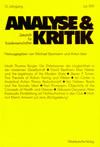ohne Titel

1983 (5) Issue 2
Table of Contents
Title: Messung von Arbeitsorientierungen. Theoretische Fundierung und Test alternativer kausaler Me ßmodelle
Author: Peter Schmidt
Page: 115-153
Abstract: In this paper we deal firstly with epistemological foundations of the process of operationalization in general and the character of correspondence rules in particular. After this we discuss the theoretical foundation of a scale for measuring work motivation. We explicate three different approaches, which can be used as a theoretical background for this scale. As a next step we specify and test different measurement theories relating the observable and the latent variables and compare their suitability. The sample used is a representative sample of the West-German population in 1980. Finally we test the stability of the best model in different age groups.
Title: Soziologische Kausalanalyse. Eine Betrachtung aus gro ßer Distanz
Author: Dieter Mans
Page: 154-194
Abstract: Is causal analysis an appropriate method to discover causal laws? Some prerequisites for any successful application of mathematical causal models are worked out and discussed. It can be shown that these prerequisites cannot be fulfilled by present models and there are strong reasons to assume that they cannot be satisfied by any model. Therefore causal analysis will probably be of no importance for the discovery of causal laws in sociology.
Title: Reply to Four Critics
Author: Gerald A. Cohen
Page: 195-222
Abstract: This article is a response to criticisms of my book on Karl Marx's Theory of History which were made by four authors in last Decembers number of ANALYSE & KRITIK. After clarifying (section 2) an ambiguity in an argument for historical materialism which is presented in the book, I contend (3-5), against objections raised by Philippe Van Parijs, that historical materialism is consistent only if it explains production relations functionally, by reference to their propensity to develop the productive forces. Next (6-8) I address and rebut the views of Wal Suchting and Milton Fisk, who both think that the role of class struggle in historical materialism is larger than the one I assign to it. Finally (9-12) I try to vindicate the doctrine of base and superstructure proposed in my book against the skepticism of Steven Lukes.
Title: The Shifting Primacy Puzzle. A Rejoinder
Author: Philippe Van Parijs
Page: 223-230
Abstract: One important claim of G. A. Cohen's Karl Marx's Theory of History is that only its functional interpretation of historical materialism can solve the "primacy puzzle", i. e. can reconcile the primacy of the productive forces with the controlling role of the production relations. Cohen's recent "Reply to Four Critics" (in this journal) does not salvage this claim against my earlier critique that it is either false or trivial. He only avoids falsehood by substantially redefining the terms of the puzzle. And with the redefined puzzle, the claim becomes trivial in the sense that one of the two terms which the primacy puzzle consists in reconciling requires a functional interpretation on its own. The "Veblenian scenario" which I put forward in my earlier text and whose full force Cohen has been prevented from appreciating by two misunderstandings, illustrates what I claim to be the general solution to the only genuine primacy puzzle.